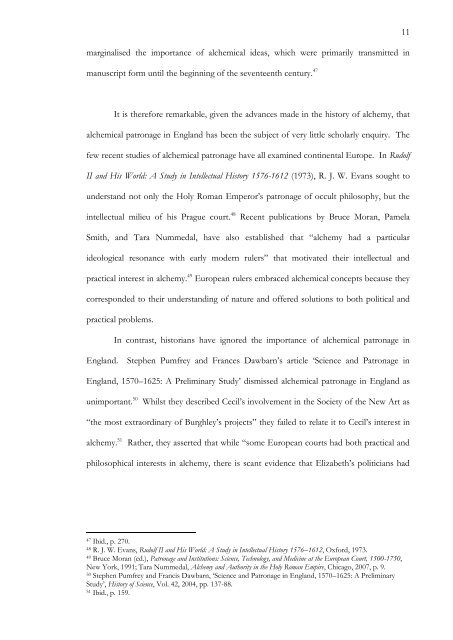The Alchemical Patronage of Sir William Cecil, Lord Burghley
The Alchemical Patronage of Sir William Cecil, Lord Burghley
The Alchemical Patronage of Sir William Cecil, Lord Burghley
Create successful ePaper yourself
Turn your PDF publications into a flip-book with our unique Google optimized e-Paper software.
marginalised the importance <strong>of</strong> alchemical ideas, which were primarily transmitted in<br />
manuscript form until the beginning <strong>of</strong> the seventeenth century. 47<br />
It is therefore remarkable, given the advances made in the history <strong>of</strong> alchemy, that<br />
alchemical patronage in England has been the subject <strong>of</strong> very little scholarly enquiry. <strong>The</strong><br />
few recent studies <strong>of</strong> alchemical patronage have all examined continental Europe. In Rudolf<br />
II and His World: A Study in Intellectual History 1576-1612 (1973), R. J. W. Evans sought to<br />
understand not only the Holy Roman Emperor‘s patronage <strong>of</strong> occult philosophy, but the<br />
intellectual milieu <strong>of</strong> his Prague court. 48 Recent publications by Bruce Moran, Pamela<br />
Smith, and Tara Nummedal, have also established that ―alchemy had a particular<br />
ideological resonance with early modern rulers‖ that motivated their intellectual and<br />
practical interest in alchemy. 49 European rulers embraced alchemical concepts because they<br />
corresponded to their understanding <strong>of</strong> nature and <strong>of</strong>fered solutions to both political and<br />
practical problems.<br />
In contrast, historians have ignored the importance <strong>of</strong> alchemical patronage in<br />
England. Stephen Pumfrey and Frances Dawbarn‘s article ‗Science and <strong>Patronage</strong> in<br />
England, 1570–1625: A Preliminary Study‘ dismissed alchemical patronage in England as<br />
unimportant. 50 Whilst they described <strong>Cecil</strong>‘s involvement in the Society <strong>of</strong> the New Art as<br />
―the most extraordinary <strong>of</strong> <strong>Burghley</strong>‘s projects‖ they failed to relate it to <strong>Cecil</strong>‘s interest in<br />
alchemy. 51 Rather, they asserted that while ―some European courts had both practical and<br />
philosophical interests in alchemy, there is scant evidence that Elizabeth‘s politicians had<br />
47 Ibid., p. 270.<br />
48 R. J. W. Evans, Rudolf II and His World: A Study in Intellectual History 1576–1612, Oxford, 1973.<br />
49 Bruce Moran (ed.), <strong>Patronage</strong> and Institutions: Science, Technology, and Medicine at the European Court, 1500-1750,<br />
New York, 1991; Tara Nummedal, Alchemy and Authority in the Holy Roman Empire, Chicago, 2007, p. 9.<br />
50 Stephen Pumfrey and Francis Dawbarn, ‗Science and <strong>Patronage</strong> in England, 1570–1625: A Preliminary<br />
Study‘, History <strong>of</strong> Science, Vol. 42, 2004, pp. 137-88.<br />
51 Ibid., p. 159.<br />
11















